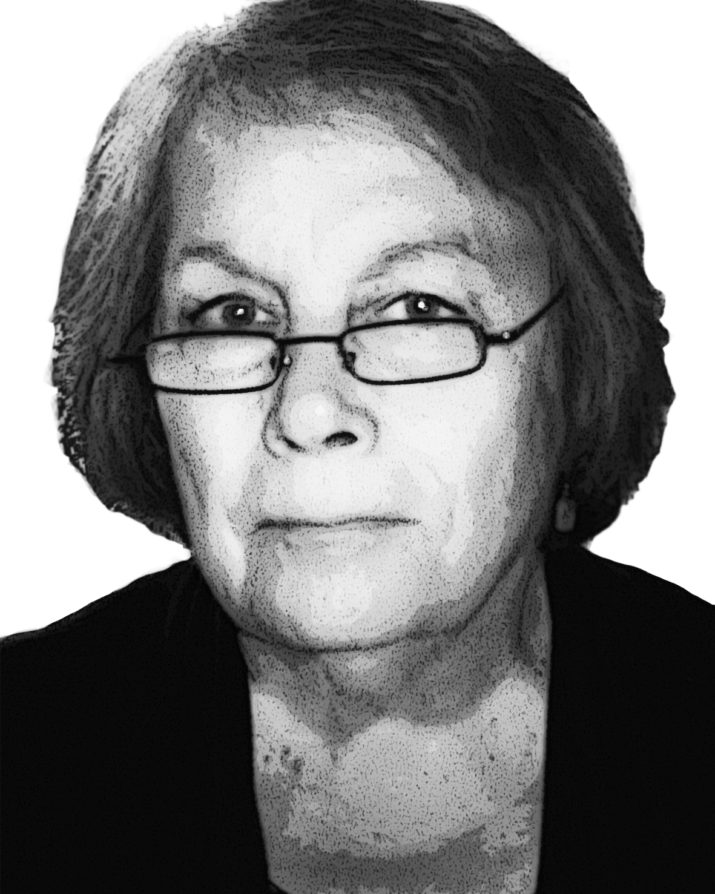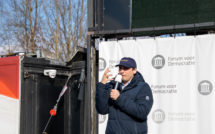

This is part of our special feature Facing the Anthropocene.
I interviewed Professor Carole Crumley for EuropeNow to learn about her approach to the relatively novel concept of the Anthropocene. As one of the founders of historical ecology and also trained in an array of social and Earth sciences, Carole Crumley is the epitome of what it means to conduct collaborative interdisciplinary research. For decades, she has devoted herself to the study of climate change and to the understanding of the transformation of agricultural livelihoods and landscapes in the longue durée, emphasizing the relationship between past, present and future to address the environmental conundrum in which humans have placed themselves in their blinded quest for “progress”.
In this engaging conversation, she draws from her own research in Burgundy (France) and her experience leading and coordinating an international network of research projects that focus on human-driven planetary change, to clearly explain why the Anthropocene may be the tool we need at this juncture in the troubled relationship between nature and the human species. She shows that, if successful in keeping the fight alive, building communities of practice with a shared understanding of sensible environmental management, mobilizing populations, and shifting the scale of action when trying to mitigate the effects of societies on the planet, the Anthropocene may be a useful companion for climate scientists to stimulate new ways to look at old innovations and to signal to all that the past can and should be the laboratory where the future of the human species gets confronted to present realities.
–Hélène Ducros for EuropeNow
EuropeNow The Anthropocene has been described as a new geological epoch that follows the Holocene and is the result of human domination on the natural world, humans having transformed the Earth biologically, chemically, and morphologically, possibly leaving traces of that human domination in geological strata. Would you rather provide another definition, or complete it?
Carole Crumley Some people say that the Anthropocene is a public relations activity, rather than a scholarly one, because in fact humans have been impacting the planet for a very long time, although at different scales such as local or regional. Thus, you could argue that the Anthropocene, because of the role of humans, should also include the previous Pleistocene and Holocene eras. We are first of all a Pleistocene species, because our primate ancestors became fully human during that period, about 70,000 years ago. As an effort to awaken the general public to issues that face our species, the notion of the Anthropocene is useful. The discussions around it cause people to have to think about how long human beings have been on the planet and when things began to change for the not so good and into the worse. I would use the word “heuristic” to describe the Anthropocene, because it gives us a way to think about these things. “Anthropocene” is an effort to explain to the general public where we are today, in terms of the history and future of the planet and the human species.
EuropeNow What is the difference between a socio-historic era like the Renaissance or the Middle-Ages and a geological epoch? Why would the Anthropocene be different from a simple socio-historic era, constituting instead an epoch on a geological scale?
Carole Crumley I am not especially willing to use a geological epoch to look at complex environmental, social, and historical phenomena. Geological time scales have to do with environmental changes that are recorded in rock formations. Geological epochs are usually determined by widespread “unconformities” – change in the composition of rock strata due to deposition of the succeeding strata under new conditions– which do not change again for millennia. What the Anthropocene discussion can do is to explain how humans have begun to change the way the planet itself behaves. For example, the oceans are changing rapidly, due to pollution, melting glaciers, overharvesting, and chemical changes that are related to increased CO2, causing acidification that destroys marine organisms. Climate change is among the several points of pressure that qualify for changing the way the planet operates. This is unprecedented; our ancestors in the Pleistocene and in more recent human history were not able to do that.
Historical ecology allows us to document ways our hominid ancestors changed parts of the African environment and we can also look at the ways in which human populations have impacted other species, for example in the debate in archeology over the extinction of large mammals. Mammoths, giant sloths and other species certainly would have been impacted by humans, but since the human population was small at the time, there is some doubt that it was a major driver. Environmental change, perhaps in concert with humans, is more likely. Changes in the “machinery of the planet” were driven by variations in solar radiation, volcanism and other phenomena. These kinds of changes are “natural”, although we always need to use this word carefully. Thus planetary machinery refers to the ways in which the planet operates as it goes around the sun. What happens if we tinker with those mechanisms?
EuropeNow You are a historical ecologist. Can you explain what your field does and why it is well positioned to provide answers in the debate over the Anthropocene?
Carole Crumley Historical ecology has a past-present-future approach. In our newest book on the subject, we expand and focus the discussion of why the past matters for the future. We are not only trying to piece together the past, but we wish to help improve sustainable management of the Earth’s resources. We encourage the search for good ideas from the past, treat them with the technology we have today, and use them in the future. The Integrated History and Future of People on Earth (IHOPE) initiative collects projects that are looking at past ideas that can be used, particularly in a specific locale or region. Communities are strengthened when they work together to improve conditions, calling people to invest in the places that are meaningful to them. Historical ecology is not a theory; it’s a framework for research and community involvement, with citizen science being part of it. For example, indigenous communities near where the ice is melting are recording evidence of their ancestors’ sites, which is helpful in wildlife management as well as anchoring local tradition. Such places used to be protected by permafrost, but now the permafrost is melting and washing knowledge into the sea.
EuropeNow Scholars have debated over the inception date of the Anthropocene, suggesting it could have started with the conquest of the Americas, or the industrial revolution, or the post-WWII economic boom. Others have gone further into history and even pre-history to recognize there the dawn of the Anthropocene. As a historical ecologist, what is your take in this debate?
Carole Crumley I think the industrial revolution is of major importance. It changed the scale of extraction. Think of those huge trucks that coal companies use, or mountain top removal; all these were impossible before new industrial techniques. The tale of American greatness has to do with railroads that crisscrossed the country, the telegraph, and the vast fortunes that were accumulated during this period of expansion. One of the things that pulled the US together was the Second World War. From then until the 1980s we did pretty well: people had education, salaries that put their family into the middle class. But with the neoliberal turn, a new prominence was given to business. I grew up in a community where people could enjoy their community’s admiration and respect and not be involved in business. A high school music teacher or a minister was respected for what they did for the community. That does not matter as much anymore. That’s what we lost; it’s all about money now, what you have, what you can buy.
EuropeNow What would a geologist or paleontologist of the future find as evidence of the passage between the Holocene and the Anthropocene? In other words, what can we say are/will be the geological markers/traces of the new epoch as compared to the previous epoch?
Carole Crumley In terms of artifacts, styrofoam and plastic will last. It has proven difficult to find a way to deconstruct styrofoam. There are also things going on at the planetary scale. With the melting of polar ice, even continents could be destabilized and important ocean currents modified or stopped. Where fracking goes on, there are more earthquakes. Such shifts will leave physical evidence. Perhaps a worst case scenario is that we continue to use nuclear power. The earthquake and tsunami that hit Japan in 2011 dumped a lot of radioactivity into the oceans, and strong ocean currents move radioactive water far from the source. This is another one of these planetary mechanisms. Why did humans put reactors in Japan, where four different continental plates come together? If we were going to do that, we should have done it where there isn’t much seismic activity.
EuropeNow Scholars have argued that the Anthropocene is a misnomer, proposing other terms to characterize our current epoch, such as Industrialocene, Occidentalocene, Capitalocene, Atomicene, Thanatocene, Anglocene, Militarocene, Technocene, Econocene, Chthulucene, Plantationocene, etc. Why do you think there is a reluctance to accept the term? What are these alternative terms trying to say and contesting? Do you think that it matters what we call it or is it more important to just realize we have entered into a new epoch, however we label it?
Carole Crumley The term is indeed problematic for different scholars. We need it, but it may not be of great scholarly use. The Industrialocene looks at technology, which I think is a big player. It is also Western, especially if you look at the history of colonialism. Capitalism has driven extraction, so we can speak of the Capitalocene; the Atomicene is not a bad one because we can now blow up both ourselves and the planet. Each of the terms has some kind of utility but it is important to think more systemically, taking human activity, the Earth system, and their interactions into account.
What is equally important is to examine the naïve assumption that every bit of technology and scientific knowledge is progress. Not everything that we think about or that is possible should be made reality. One example is Pleistocene rewilding—bringing back mammoths, sabre-toothed cats and other creatures of that era. It’s a bad idea from so many points of view, not least being how “genetically reconstituted” animals from other environments and from long ago would impact contemporary flora and fauna. If it can be done, it would still be a flawed and not particularly enlightening reconstruction of the past.
The idea of progress is enormously influential. So are religions, because they guide thinking about the world. The idea of the Anthropocene is heavily Western in scope, in part because the book of Genesis and other religions told people to multiply and take the Earth as our own to do what we will. The future of Earth and its peoples will continue to be formed by our beliefs; yet many ancient religions placed Earth in a key role, and that may once more be possible.
EuropeNow What do you think can be some long-term socio-cultural and political consequences of the Anthropocene?
Carole Crumley I can only speak to that in terms of the people I know well, in Burgundy (France). Many of my farming neighbors are unwilling to embrace the idea of environmental change, in great part because they are not heard by decision makers and that financially they have little choice but to continue as before. Many of these farmers are hunters, who are charged with collecting information on game species for a regional agency. The agency evaluates the size and the health of the deer or rabbit or boar population and estimates how many hunting bracelets can be given for the next year. Today, there are hardly any rabbits. Where are the small mammals that lived in hedgerows and all the plentiful birds that people used to hunt? It’s not that they went to live somewhere else. There has been some hunting pressure, but there are other reasons as well. The region’s abundant raptors are protected by law, and national and EU regulations require management practices that damage hedgerows. People still remember one Minister of the Environment who was neither well informed nor skilled at communication. She angered many people, scolded hunters. Hunters care about those animal populations, but at the same time they don’t care so much that they are willing to take the much smaller EU subsidy for maintaining their hedgerows, as opposed to ripping them out and putting more cattle on their land; thus remembrement (combining of adjacent parcels) is driven by non-local forces. Even though people are concerned, many try not to think about it because it is too depressing.
EuropeNow The Anthropocene has caught on in the media and popular culture as a catchy topic. Do you think that it is a good thing or do you see problems with this popularization of the term/concept? And what about those climate mega-events like the COP21?
Carole Crumley We have to try things like the COP 21. We cannot abandon these huge efforts that attempt to turn things around. There has been progress in emissions. But this progress is easily disturbed (e.g., political shifts). We can fight unconcern for the environment by getting people involved, into the streets, connected with those who also care about the health of the planet we live on. Many have become more concerned at the local scale: with communities and collaborative efforts, the recovery of the commons, and the renaissance of small political entities. We can do a lot working this way. So, I am not sure those great international efforts are the way to go anymore, and certainly not the only way. I do think that when a term or concept becomes too mainstream and gets abused by overuse, it loses it power, the same way it has happened already to the term resilience. The notion of resilience does not hold in the long time frame. You can only be resilient for so long before changes occur, things fall apart, and something new comes.
EuropeNow Is there hope? Is the Anthropocene reversible? What would it take? Who do you think are the actors that can make it happen? Considering the fact that the Earth Overshoot Day is coming earlier and earlier every year, is there seriousness to the idea that the Anthropocene might be short in terms of geological time because humanity will come to an end due to our ecological overspending?
Carole Crumley At the rate we are going, we will not survive as a species very much longer. We are doing destructive things to our home the planet, and it will lead to our own decline. But, in 200,000 years the planet will probably be fine. We can be the force that drives the next phase of extinction (including ourselves), but the planet will renew itself. It is not a very cheerful time for those of us who feel strongly about environmental issues. The ongoing loss of species and habitats eventually impacts humans in terms of what supports them, their ways of life, and the ability to experience the world’s wonders as our ancestors did.
Our ancestors were good observers, this is what has always made the human species special. We are also experimenters. If something does not work, we try something else. Generations ago, those experiments were mostly in the hands of ordinary people. Today, they are more likely to be imposed on us, with top-down invasiveness, driven by globalization. One example is the ancient, CO2 mitigating forests of the Amazon, which are being turned into farms that will not continue to be productive. The farmers, from elsewhere, are looking for secure lives. We must come to the realization that we are only at the beginning of a period of global-scale migration.
We will not be particularly good at protecting heritage sites from climate change. I wish good luck to the Côte d’Or (France) vineyards that in 2016 became a UNESCO heritage region. It is, in many ways, wishful thinking that the region will not change, not least because with climate change it is going to be very difficult to maintain the key relationships among soils, microclimates, and treasured vines (cépages). On the other hand, many vintners are actively exploring new ways (and places) to continue their work. But the Côte d’Or will be a different place.
I cannot say that I am optimistic because there are huge forces against us. But I am also unwilling to “baisser les bras”[1]. I am going to fight and be as active as I can. The resilience paradigm is visualized as a “lazy 8”, a diagram that talks about a building phase (energy, capital), followed by a maintaining phase, and then by collapse. But then, many new options appear and new forms take the place of old ones. I have been thinking about human societies in this way. Democracy and human dignity must be fought for all the time. We cannot rest, but instead remember that these are ongoing struggles, like the current resurgence of nationalism, xenophobia, and misogyny. But–and this is where my optimism comes out–we need to recognize that this is also a time of opportunities that have not been available for a very long time. We thought there would be general progress upon which we could count, but in fact it is work that goes on and on. The archeological record witnesses this cycle: things get built and fall apart. People discover skills they did not know they had and they put things back together. It’s been going on for a long time and will continue, unless we make a nuclear mistake. If we don’t irradiate ourselves, I think humanity might make it.
In his book L’Amérique qui vient, Christophe Deroubaix[2] argues that demographic patterns suggest that young people in the US, Europe, and elsewhere are horrified by what is going on. Many Trump voters are jobless, middle aged males in the Rust Belt or Midwestern farmers trying to make a living on farms that were independent and prosperous in their parents’ time. They are angry because in their lifetime they have seen stable family life fall apart. In France and elsewhere in Europe, many of the same forces are at work. People mourn the disappearance of a vibrant rural life. Provincial towns and cities were lively in the 1970s, but by the 1990s the hollowing out of rural life was well underway. Successive French governments have made little effort to retain jobs, hospitals, schools, and other services in rural areas. Younger people worry about the world they will inherit. In the US, the biggest disapproval rating of Trump is the 18-35 demographic. So Millennials give me considerable hope.
I don’t think we can stop global warming at this point, but we can mitigate it. If humanity is able to learn quickly, our species could continue to flourish, but humanity may already be aboard a planetary Titanic. What redeeming arguments can we leave, perhaps for no-one, that showcase the pacific side of a species with the conscious ability to destroy life on the planet? How, practically and ethically speaking, can we set out into space in the search for other planets to ruin?
Researchers drawn to historical ecology aren’t ready to discard a legacy which could help us shape a more desirable future in a changed world. This legacy includes an intangible store of knowledge: how societies are and have been organized, how important information is transmitted from one generation to another, and how to get along with each other individually and in groups. This is the very fabric of society.
The social sciences and the humanities and flourishing contemporary communities are storehouses of information about how we can construct durable and meaningful societies. Societies give us confidence, emotional comfort, and a sense of belonging. Environmental sciences, traditional knowledge, and other ways of knowing about our surroundings offer understanding of a critical bond with the natural world that supports us. Scholarly research must join with lived experience.
So the first thing to bring with us into the future should be a guidebook for the territory that has already been charted. The flexible toolbox of historical ecology enables us to learn how environments, practices, and policies interact over time. We must explain the importance of the past to sceptics, examine some means by which the past can help meet enormous global challenges, and offer some ideas that are already available for charting a livable and satisfying future for our species and a healing prescription for Earth.
Carole Crumley is Professor of Anthropology (emerita) at the University of North Carolina, Chapel Hill (USA) and is currently Executive Director of the Integrated History and Future of People on Earth (IHOPE) at Uppsala University in Sweden www.ihopenet.org . A founder of historical ecology, she is trained in anthropology, archaeology, classics, geology, climatology, and landscape ecology. She studies long-term landscape change in Burgundy, France. Issues and Concepts in Historical Ecology (Crumley, Lennartsson, and Westin, eds.) will be published in 2017 by Cambridge University Press.
Hélène B. Ducros is Chair of the Research Editorial Committee at EuropeNow. She obtained a JD and PhD in geography from the University of North Carolina-Chapel Hill. Her research delves into rural livelihoods, rural heritage preservation and the effect of tourism and branding on historical landscapes construction, perception, and imaginaries. Starting this Fall, she will be Lecturer in International Studies at the University of North Carolina-Wilmington.
Photo: Carole Crumley, Private
References:
[1] Give up.
[2] Deroubaix, Christophe. L’Amérique qui vient, Ivry-sur-Seine: Les Editions de l’Atelier, 2016.
Published on May 2, 2017.




